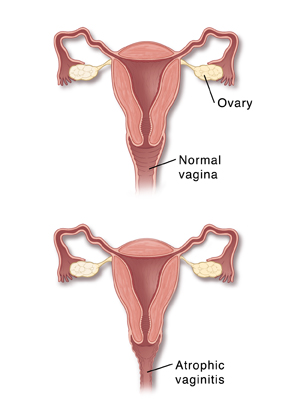Atrophic vaginitis means the walls of your vagina have become thin. This happens when your body makes too little of the hormone estrogen.
Menopause or surgical removal of the ovaries are the most common causes of a drop in estrogen. Breastfeeding can also cause the hormone level to drop.
Symptoms of atrophic vaginitis include:
-
Dryness, soreness, burning, or itching in the vagina.
-
Vaginal discharge.
Sex can be uncomfortable, even painful. After sex, you may have bleeding from your vagina. You may also have burning or pain when you pee (urinate).
Home care
Your health care provider may advise one or more of these as treatment:
-
Vaginal creams, lotions, and lubricants. These products help relieve vaginal dryness. They don’t need a prescription. They can be found in the personal care section of most pharmacies. Creams and lotions are used daily to help keep the vagina moist. Lubricants help reduce dryness and pain during sex. Choose water-based lubricants. Don’t use petroleum jelly, mineral oil, or other oils. These increase the chance of infection.
-
Hormone therapy (HT). HT increases the amount of estrogen in your body. This can help manage or relieve symptoms. HT can be given in pill form. It may be given as a lotion, cream, ring put into the vagina, or a patch on the skin. The risks and benefits of HT vary for each person. For instance, your risk may be higher if you've had breast cancer. Discuss this treatment with your provider. Not everyone can use HT.
You don’t need to stop having sex. In fact, regular sex can help keep vaginal tissues healthy. Take steps to make sex more comfortable by using water-based lubricants.
Preventing infections
Atrophic vaginitis makes an infection of the vagina or the urinary tract more likely. To help reduce your risk:
-
Keep your genitals clean. When you bathe, wash the outside of your vagina with mild soap and water. Clean gently between the folds of your vagina.
-
Wipe from front to back after a bowel movement.
-
Don’t douche unless your health care provider tells you to.
-
Don't use scented toilet paper, scented vaginal sprays, or scented tampons.
-
Don't wear clothes that are tight in the crotch. These include pantyhose, jeans, and leggings. Wear cotton underwear. Change it every day.
Follow-up care
Follow up with your health care provider, or as advised.
When to get medical advice
Contact your health care provider right away if any of these occur:
-
Fever of 100.4°F (38°C) or higher, or as advised by your provider
-
Symptoms don’t go away or get worse even with treatment
-
Vaginal area swells or becomes painful
-
Vaginal area bleeds, but not because of your period
-
Bad-smelling discharge from the vagina
-
Pain or burning feeling when you pee, or you have trouble peeing
-
Open sores develop around vagina
Featured in


